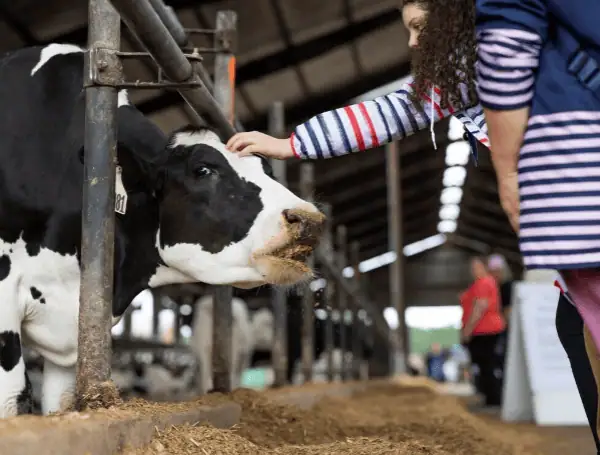
Scientists at the University of Florida (UF) are making strides in sustainable agriculture with the development of a novel cattle feed supplement that could significantly reduce methane emissions from dairy cows while improving their nutrient absorption.
This innovative research, led by Associate Professor Antonio Faciola, explores the potential of a feed made from flaxseed and pea protein to create a more environmentally friendly and efficient dairy farming industry.
READ: Iowa Sen. Grassley Champions Biofuels, Emphasizes Economic Boost For Farmers
Published this month in the esteemed Journal of Dairy Science, the study addresses the significant environmental impact of methane, a potent greenhouse gas naturally produced during cows’ digestive processes, primarily through burping.
Beyond its climate implications, methane production also represents a loss of valuable energy for the animals, energy that could otherwise be utilized for milk or meat production.
“It’s a win-win situation. Every time we reduce methane, we keep that energy in the cow’s body,” explained Faciola from UF’s Department of Animal Sciences.
Crucial to this research was the work of James Vinyard, a research assistant professor at the University of Alaska and a former postdoctoral student at UF. Vinyard played a key role by simulating dairy cattle digestion in a laboratory setting.
This allowed the researchers to meticulously measure methane production and investigate how adding a supplemental feed could optimize the fermentation process within the cow’s rumen.
The team introduced the flaxseed and pea protein supplement into the simulated rumen environment and observed the resulting changes in fermentation. Their findings revealed that the supplement, rich in omega-3 fatty acids and proteins, effectively reduced methane production and enhanced overall digestion efficiency.
“This supplement has multiple potential benefits,” Faciola stated. “Not only could it reduce methane emissions, but it might also increase energy availability for cows, potentially leading to increased milk production.”
Looking ahead, the researchers are eager to validate their promising lab results through real-world trials. Future studies will involve feeding the supplement to live dairy cows to assess its impact on methane emissions and milk production under typical farming conditions.
In an era where global food security is an increasing concern, the implications of this research extend beyond environmental benefits. Faciola emphasized the critical need for more efficient livestock feeding practices to meet the growing global demand for food.
“We will need to have cows producing more milk with the same amount of food,” he stressed. “We have to be more efficient to feed more people.”
The study received partial funding from O&T Farms Ltd., a Canadian company specializing in animal supplements, highlighting the collaborative efforts between academia and industry in the pursuit of sustainable agricultural solutions. The findings from this UF research offer a hopeful glimpse into a future where dairy farming can contribute less to climate change while simultaneously enhancing food production efficiency.
Please make a small donation to the Tampa Free Press to help sustain independent journalism. Your contribution enables us to continue delivering high-quality, local, and national news coverage.
Connect with us: Follow the Tampa Free Press on Facebook and Twitter for breaking news and updates.
Sign up: Subscribe to our free newsletter for a curated selection of top stories delivered straight to your inbox.
